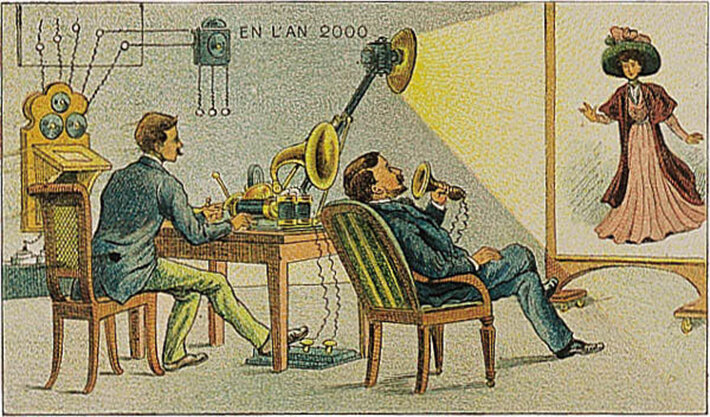The New Digital Regionalism (an essay)
by Ian Howell
17 August 2020
I’m playing around with a concept that I’m calling, “the new digital regionalism.”
We always think about the future. We always get it wrong. About the telephone they said, “Like reaching with a magic wand out across the earth; space annihilated, the whole world kin.” When I was a kid, DeeLight promised me that I lived in a, “global village, in the age of communication.” The persistent narrative of the techno-future is that of the total connection of humanity, the dissolution of geographic space, and the healing of related social ills.
But it’s never that. They predicted the telephone would result in a worldwide homogenization of language. Instead we have nations fire-walling their own internet and teams at google inventing new character encoding schemes to onboard every human alphabet. There is space between “all humanity kin” and The West Wing’s, “they promised me flying cars in the future and all we have is the world’s most efficient distribution system for pornography.”
I think what lies in the middle is what it means to actually communicate and collaborate in real time with others online. We never would have explored this, but for the virus. It literally has taken our preferred medium of communication, air. Air belongs to the pathogen now, and the humans need to find different solutions.
So consider the following idea. Pre-Covid, we all had a lingering, multi-layered sense of world-wide human connection. Hypothetically, with money and time, we could go anywhere on the planet with our physical bodies. If we wanted to send information instead, we long ago decoupled the maximum speed of a human from the maximum speed of data.
But in reality, instantaneous communication meant being in the same air. Watch as many Met HD broadcasts as you want, no one can throw a flower on stage from their movie theater. That fourth wall is transparent but unbreakable. Even likes and hearts responding to a Facebook livestream take place after the fact, with a minor delay. The flow of information is slow enough to prevent anything but a one way presentation of something real. Of mediated culture.
But take away the air and something strange happens. Low latency audio platforms actually EXPAND our reach. Geographic space actually is annihilated. And here is where the academic study of historical communication can help.
I propose that pre covid we held the world at a distance defined by the speed of travel and communication. We had a sense of the space we were in that extended beyond our bodies. If you’re in Boston, San Francisco is definitely in your catalog of places you could physically go in a way that the surface of Mercury will never be (yet...). San Francisco is also in your catalog of places you could easily send information to. But no matter what, you would never expect to be able to clap four beats in sync with someone else. For that matter, if you’re in Boston, you would never expect to be able to clap four beats in sync with someone in New Haven. It is just not part of our sense of how our physical bodies exist in and can interact with our environment.
But the virus took the air. And here we are.
I want to propose that even in this short time since March 2020, we have experienced a cultural shift the likes of which can only be compared to the advent of jet travel, the laying of commercial telegraph wires, or the invention of the telescope and semaphore flags.
Low latency audio programs literally have the potential to broadly shift our sense of how we exist in geographical space. Solely due to the need for truly synchronous interactions, this will find purchase first within the arts. Literally, our sense that culture is consumed globally but created hyper locally can now shift.
In its place, we find a new digital regionalism. The topography of this space roughly aligns with geographic regions. But in reality, it is the contours, highways, and cul-de-sacs of the Internet itself that define those within and without reach.
This may seem like a small thing, especially if zoom has left you with the sense that the only spontaneous music making now takes place in our homes, exclusively with those immediately around us. But that’s because we are all still reacting from a position of crisis management, desperately attempting to preserve the world that existed in February. Look around, and realize that your community of synchronous collaborators just expanded by miles and miles and miles. If you are in Boston, you can literally make music as though you were in the living room, practice room, or concert hall of your friend in New Haven. San Francisco? No. Because the speed of communication is still the speed of communication. However, your colleague in San Francisco now finds themselves part of a digital region that conceivably extends as far south as San Diego.
So start.
Use the tools you have already.
Advocate for the expansion of broadband Internet in regions that are underserved.
Educate yourself, your colleagues, and your students about how to use audio equipment and platforms like SoundJack (or whatever is next).
Plan a project, put it on your calendar, show up, and share the results.
And last, amid all the terrible things you are currently living through that your grandchildren will read about in a history book, please keep in mind you’re also living through a miraculous transition in the way that human beings interact with technology, conceive of communication, and define their sense of personal space. Such a shift may only happen a few times in each of our lives. It’s happening right now.
.
.
.
.
.
.
.
Also I’m wrong and won’t know how for decades.
